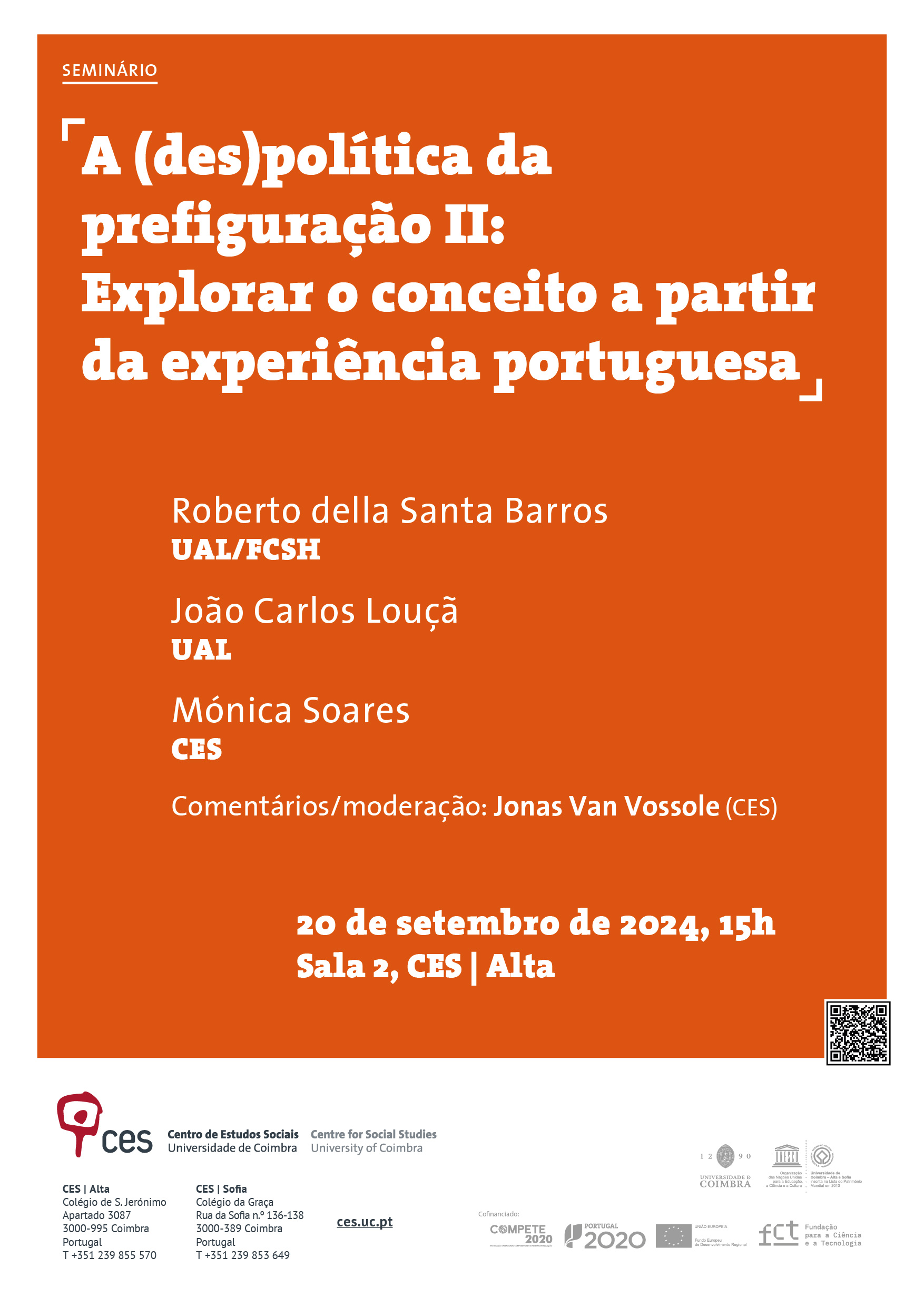Seminar
The (de)politics of prefiguration II: Exploring the concept from the Portuguese experience
September 20, 2024, 15h00
Room 2, CES | Alta
At a time when frustration, melancholy, and disenchantment with universal hopes for social transformation seem to have come to define contemporary subjectivities, the idea of prefiguration seems to have fuelled the action of different social movements and collective initiatives, both urban and rural.
The previous seminar on the subject addressed the idea of ‘prefiguration’ from a far-reaching historical perspective, as well as discussing its preponderance in new contemporary social movements, which have sprung up and become popularised over the last few years within a social-political climate typically described as ‘end of history’ and post-political.
This second seminar aims to continue this discussion but with a focus on the multiple local practical expressions that have drawn heavily on the idea of ‘prefiguration’ in Portugal over the last few decades, from the social experiments of the PREC to contemporary eco-villages. Our aim will be precisely to examine and discuss how these concrete practises could/can, and to what extent, challenge the dominance of the regulatory conditions in which they germinated, including potentialities and difficulties. At the same time, we propose to examine the notion of ‘prefiguration’ from and against the very perspective of temporality that the concept carries.
Speakers: Roberto della Santa Barros (UAL/FCSH), João Carlos Louçã (UAL), Mónica Soares (CES)
Comments/moderator: Jonas Van Vossole (CES)
Bio notes
Roberto della Santa Barros is a scientific researcher at the Centre for Global Studies of the Universidade Aberta in Lisbon. He was a visiting assistant professor at the Department of Social, Political and Territorial Sciences at the University of Aveiro (DCSPT) and the Academic Master’s in Public Policy (MAPP) at the same institution. He is an effective member of the Postgraduate Programme in Interdisciplinary Global Labour Studies (FCSH/UNL) and scientific coordinator of the Observatory for Living and Working Conditions (ocvt.unl.pt). His most recent publications are: ‘A Brief History of Portugal: The Contemporary Age’ (Co-Auth. Raquel Varela), ‘Working and Living in the 21st Century’ (Co-Ed. Duarte Rolo), and ‘Global Labour Studies’ (Co-Ed. Pamela Cabreira). He has experience in the areas of research on workers/co-research, social sciences/public policy, critical social theory/methodology of the social sciences and labour/organisation studies, with an emphasis on social/critical thought, collective action/historical agency, history of ideas/intellectuals, sociology of culture/art, and so-called ‘Byt’ issues. [быт - Russian for “everyday life”].
João Carlos Louçã has a degree in Anthropology (1997) from the Faculty of Social and Human Sciences of Universidade Nova de Lisboa. In 2019, he completed his PhD in Anthropology at the same faculty, with the dissertation ‘Pensar o Impossível, Transformar a Realidade - A prática da utopia concreta no Porto e nos Pirenéus’ [Thinking the Impossible, Transforming Reality - The practice of concrete utopia in Porto and the Pyrenees]. He is a member of the working group on time and temporalities of the Latin American Council of Social Sciences (CLACSO) for the 2023-25 biennium, as well as the Red(e) Iberoamericana Resistencia y/e Memoria (RIARM) and the Associação Observatório para as Condições de Vida e de Trabalho. He is a researcher at the Centre for Global Studies of Universidade Aberta (CEG-UAb). Since 2023, he has been executive editor of Workers of the World: International Journal on Strikes and Social Conflicts.
Mónica Soares has a master’s degree in the psychology of justice (2013) and is currently a PhD candidate at the Centre for Social Studies and the Institute for Interdisciplinary Research of the University of Coimbra. Since 2012, she has participated in various research projects at the Portuguese Catholic University (FEP-UCP) and the University of Minho (School of Psychology; CICP). At FEP-UCP, she is a guest lecturer on the Integrated Masters in Psychology and the Interdisciplinary Postgraduate Programme in Human Rights. As a researcher and/or visiting lecturer, she has collaborated with the Institute of Social Sciences and Humanities (ICSyH-BUAP, Puebla, 2018-2022), the Faculty of Legal and Social Sciences of the University of La Plata (La Plata, 2020) and the Centre for Community Studies (CEC-UCLV, Santa Cara, 2016-2017). Soares researches social movements, critical theory, participation and political subjectivity, criminology, juvenile delinquency and the psychology of justice, justice policies, feminist studies, and utopian studies.
Jonas Van Vossole is a Marxist economist, political scientist and sociologist. He was a researcher at the Ghent Association for the Studies of Parties and Participation (GASPAR). His main research themes are democratic theory, social movements, labour, Marxism and political ecology. He is currently an FCT researcher at the Centre for Social Studies, co-coordinator of the Ecology and Society Lab (ECOSOC) and regional coordinator of the Portuguese Political Economy Association.


